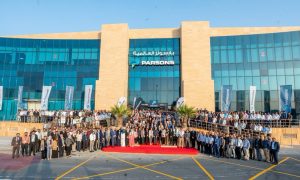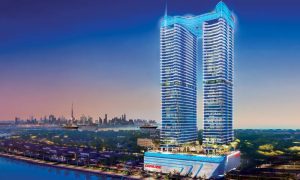The race to Net Zero in the GCC
Achieving Net Zero targets in the GCC is a complex mission that will require ongoing government drive, clear strategies and measurable plans says Campbell Gray, CEO, Middle East & Africa at Atkins, a member of the SNC-Lavalin Group

Countries globally are implementing long term strategies to reduce their greenhouse gas emissions, promote circular economy practices and ensure that their future-focused planning enables measures to minimise their carbon footprint. A key question is whether planning has been done holistically and whether there is sufficient urgency in those plans to meet the communicated Net Zero targets.
Within the GCC, Saudi Arabia, the UAE and Bahrain have committed to becoming Net Zero and have announced their respective targets. It was also announced during COP26 that the upcoming two meetings will be held in the Middle East – Egypt in 2022 and the UAE in 2023, which aligns with their governments’ commitment to accelerate the journey towards achieving a Net Zero Carbon future.
Meeting Net Zero targets takes time, effective policies, engineering advancements and of course government will-power. Time is not a luxury on offer, but having target dates for Net Zero will motivate GCC countries to focus on planning schedules and accelerate build times, especially for energy systems. To meet their Net Zero targets, Saudi Arabia and the UAE have each released strategies that provide key milestones at either a country or, for the UAE, emirate level.
To help the region achieve its Net Zero targets, the SNC-Lavalin Group, including Atkins and Faithful+Gould, has launched the ‘Engineering Net Zero in the GCC’ report that outlines challenges, opportunities, and key recommendations to decarbonise the energy, built environment, and transport sectors. Globally, the company has developed the ‘Engineering Net Zero’ (ENZ) programme, which focuses on leading the engineering industry to achieve Net Zero Carbon as rapidly as possible, by helping clients manage climate risks and build climate resilience.

Energy transition
The ongoing energy transition within the GCC is the foundation of governments Net Zero strategies. Decisions around heavy industry, the built environment or transport, directly influence opportunities within the energy sector. GCC countries are developing a mix of utility-scale solar, wind, waste-to-energy, and nuclear power as part of their planned low-carbon energy mix. It is possible that build rates of both generation and grid integration projects, which must be considered in conjunction, may need to accelerate to meet government timelines.
The size and pace of clean energy targets in Saudi Arabia and the UAE, particularly when put into context of each country’s Net Zero targets, leaves no room for slow decision-making. Given the complexity of government plans, combined with the changing grid-connected energy mix that will include firm and intermittent power along with storage, countries will need an energy system architect (ESA) to enable decision making. An Energy System Architect (ESA) will ensure well-engineered plans can meet the net zero energy challenge which involves optimizing the use of natural resources, while overseeing decarbonisation strategies at the same time.
Sustainable cities
Sustainable urban master planning is a key aspect of future Net Zero strategies. Sustainable cities need to consider livability, work and access to essential services by a range of non-car and road-based modes. Conscious design and planning that achieve Net Zero goals need to appreciate life-centric approaches to the built environment. Delivering high performance-built environment solutions for new and existing urban environments is a critical activity and will be at the forefront of decarbonising cities in the GCC. To help reduce carbon emissions for existing buildings, the company has developed Decarbonomics, a data-driven solution to decarbonise the built environment in a cost-effective way to enable asset owners to contribute to demand reduction and Net Zero goals.
Digital technologies will introduce new approaches to the construction process and provide data that can be analysed, understood and acted upon. The construction sector has been slow to digitalise, but the pace is accelerating, especially as more case studies reach the market on the benefits of such transformations and as clients demand more digital clarity from planning to handover. Modular construction and green high performance building materials, including 3D printing, green cements, green steel using carbon capture, will clearly play a key role in decarbonising the built environment for new developments, but we need to move quicker.

Transport and mobility
GCC countries, in particular Saudi Arabia, the UAE and Qatar, have invested heavily in their transport networks in the past decade, but there can be no denying that for internal travel all countries are still heavily reliant on petrol-based car ownership and use, as well as road-based freight. Among other reasons, this is due to the rapid growth of cities and communities that have been designed around the car. Land-based public transport networks will play a major role in achieving GCC countries’ Net Zero strategies. Existing metro and tram networks are not yet extensive, however, and new lines are needed that go to more locations if mass transit is to contribute significantly to a decarbonised transport network.
In addition, over the coming decades other technology options such as Hyperloop and maglev can induce much less friction than conventional rail systems and require less power to cover the same distance. The electric power for these systems, if they ever come to fruition, will need to come from clean sources for them to contribute to being a low carbon transport system. Aviation can actively electrify airport ground vehicles and install more solar power for use in terminals, while longer-term research focuses on alternative or cleaner fuels for aircraft, including hydrogen.
In conclusion, achieving Net Zero targets in the GCC is a complex mission that will require ongoing government drive, clear strategies and measurable plans, collaboration between key stakeholders, a willingness to invest in new technologies and an understanding of the various interdependencies across industries within each country. The energy, transport and built environment sectors are interconnected, and Net Zero decisions and policies on one, will have a direct and indirect impact on another. A holistic and joined up perspective is fundamental to transitioning to Net Zero in the most effective way and shaping a more sustainable and global future first approach across the region.
Read more:
- “There is a mountain to climb for individuals, businesses and society as a whole towards a greener, low carbon future”
- “The industry needs to move from reactive to frontline lead and drive climate targets”
- A circular economy can drive the way forward for sustainable infrastructure
- The region’s journey to Net Zero development with insights from four regional experts
























